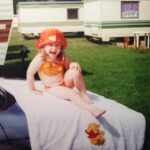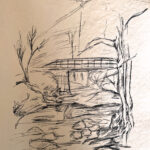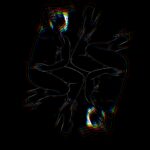I died last summer.
I woke up this morning.
I crawled out of my bedsheets with sleep still in my eyes, brushed my teeth, smeared beeswax on my lips, stumbled towards the coffee pot. I sipped the coffee and watched the sun rising over the granite tenements, wearing my friend’s band’s shirt, no makeup, bed hair – I felt almost beautiful. Cold, crisp, fresh. Even recovering from a skin infection. I felt happy to be watching the sunrise.
I woke up. That in itself is a small miracle.
Coming so painfully close to ending my life last summer taught me more things than just to enjoy sipping coffee on a window ledge at six in the morning. I suppose it taught me to romanticise my life a little bit more. That actually, it’s not that cheesy to think about swimming in the sea, or how the mid-afternoon light looks in a friend’s eyes, or how beautiful those clouds are. If it makes you smile, if it makes you happy, then it’s worth it.
I suppose it also made me see that a lot of the stuff I thought mattered a lot, doesn’t really matter at all. I doubt anyone except myself cared all that much about if I was appearing fully made up, in a nice outfit with perfect hair, or if I gained 5lbs, or if I hadn’t shaved my legs, or if I didn’t get a certain grade or if I was 6 months behind on my own self-prescribed 5 year plan. I was piling on pressure to look a certain way 24/7, act a certain way, be a certain way, live up to this expectation I was placing on myself. Don’t sweat the petty stuff and don’t pet the sweaty stuff, right?
It’s all well and good talking about what almost throwing yourself of a gorge bridge taught you months after the fact. What I don’t think any of us talk about enough is the in-between bit, you know after you nearly plunge to your death but before you’re sitting drinking coffee and full of clichés like some old fucking hippie. This is, of course, only my experience of it. Buckle up, kids.
The first 24 hours are going to feel like literal, living Hell. If you end up, like I did, in a hospital – you can expect them to take blood every few hours, so your veins are going to hurt. And there’s going to be prescribed food time where they’ll make sure you clear your plates, which is going to wreck havoc with your stomach if you had barely been eating before. Oh, and prepare for a caffeine headache like you’ve never had, ’cause the tea and coffee in there is strictly decaffeinated. They don’t take your phone, at least not on the ward I was on, but they do take your charger, your razors, your Bic pens, even the strings from your hoodie. Anything you could jerry-rig into a noose, anything you could conceivably hurt yourself with. Not that you care. You will spend those 24 hours curled up in a ball on the bed, and you won’t care about anything, you won’t move. If someone speaks to you, you won’t reply because you won’t know what to say. Nothing on your phone will be of any consequence to you. BBC could have announced the world was ending in 15 minutes and you wouldn’t blink. You won’t cry, you won’t talk, you won’t move. You’ll barely even think. At this stage, you’re essentially a corpse with a heartbeat.
Once the 48 hour mark hits, you’ll begin moving. They might even force you to shower at this point, which will be a deeply disturbing experience because it’s the first time you’ll have seen yourself in the mirror, and you’re going to look fucking terrible. Ever looked in a mirror and not recognised the reflection? I have. I stood there for about 10 minutes raising my hand to try to make my brain understand the thing staring back at me, was me. Then another 10 touching my reflection and crying. This will exhaust you. But it’ll also kick you, gently. Maybe you’ll begin trying to converse with other people. You won’t be discussing the works of Hugo but you might manage to exchange basic pleasantries.
The good thing is – the drugs, benzodiazepines and sedatives and SSRIs, will provide you with a nice warm, safe blanket, protecting you from the outside world. They’ll prevent anything – good or bad – from touching you, you’re wrapped in a fluffy cloud of chemical friends. The bad thing is – the drugs, benzodiazepines and sedatives and SSRIs, will provide you with a nice warm, safe blanket, protecting you from the outside world. They’ll prevent anything – good or bad – from touching you, you’re wrapped in a fluffy cloud of chemical friends.
Around the 72 hour mark, if they’ve decided you’re sane, they might let you go home to the care of your family with a heavy script and some psychiatric nurses visiting the house every couple of days, and strict orders to rest. Resting won’t be difficult because you’re essentially mildly sedated. Seeing the people who love you will be. You’ll feel guilty for what you just did, ashamed of yourself, embarrassed. Perhaps you’ll feel like a child who has done something wrong. Perhaps you’ll think you’ve let them down. Other people – people who aren’t so nice, they’ll treat you like a freak show. Their big, glaring curious eyes will scan your exhausted face and they’ll ask intrusive questions. Sylvia Plath described those people in “Lady Lazarus” better than I ever could;
The peanut-crunching crowdShoves in to seeThem unwrap me hand and foot——The big strip tease.Gentlemen, ladiesThese are my handsMy knees.I may be skin and bone,Nevertheless, I am the same, identical woman.
There is no coming to consciousness without pain. People will do anything, no matter how absurd, to avoid facing their own Soul. One does not become Enlightened by imagining figures of light; but by making the darkness conscious.
And that’s exactly what you end up having to do. If you make the decision that you really don’t want to feel this way ever again, you must look around the life you’ve returned to and make conscious decisions, which will not be easy. You have to look at your relationships and ask difficult questions – am I being true to myself in this relationship? Am I being made to fulfil a role, a character? Am I setting healthy boundaries? You end up looking at your eating habits, your drinking habits, your smoking, your nasty tendency to fall asleep with a full face of makeup on because you can’t bear to look at your face without it, and begin to make conscious decisions. They don’t happen all at once – doing any of this all at once would be unsustainable. You might even realise that you don’t want the job, relationships, community that you had before – that you’d only been continuing on with any of them because you weren’t consciously there. You’d never allowed yourself to think about if any of it was what you really wanted. You’d just kept going.
Then there’s all the unlearning. You’ll have to unlearn shit that you’d been taught since you were a toddler. For example – as a woman, I was socialised not to be aggressive and to avoid conflict. This resulted in not telling enough people to fuck off. I had to learn to tell more people to fuck off. You need to unlearn negative thought cycles and bad habits. You need to unlearn all the bad shit that was weighing you down.
Remember earlier I said there was going to people you get rid of later in your recovery? Yep. This is the stage it happens in. And it’ll be hard. This step was the most difficult for me – taking a long, hard look at yourself and your choices is never easy. The first step is forgiving yourself. The second is doing something. Saying goodbye, forcing distance – it’s not easy, but the benefits are worth the costs.
You’re probably about three months in now, proud of you. This is when you’re going to make another realisation. That in fact, a version of you has died. The version of you that felt like there was no lights left in the world, doesn’t exist anymore. They’re dead. They’re gone. They’re as little “you” as a photograph of you as a four year old child is still the same “you” that is reading this. Yes, technically it is still “you”, but you have nothing much else in common.
(I don’t recommend doing what I did to learn all of this. You can symbolically kill off a version of yourself whenever you want and not do any lasting damage – take the lessons I’ve learned from a horrible experience, don’t repeat it. Genuinely, if things are getting that bad – I know you won’t feel like it, but people do care. Speak, ask for help, cry and scream and throw things until you’re exhausted on the floor but please get help. There truly is nothing so horrible, so bad, so dreadful that we can’t fix it together. Nothing worth throwing everything away.)
The final step is one that creeps up on you slowly. You begin to realise that you’ve only been experiencing a very narrow slice of emotions for a long time. Then suddenly that slice gets wider, and wider, until you’re experiencing a whole spectrum of emotions again. It’s no longer “apathy” or “sad” or “anxious” – suddenly there’s “nervous butterflies”, there’s “weepy-happy”, there’s “melancholy”, there’s “early morning peaceful”…and it keeps growing, until you’re experiencing more and more. And you hopefully begin to see emotions as what they are – passing things, human responses out of our control. We can’t control them, but we can’t let them control us either. You might even learn to sit in them, think about why you feel this way, and then let it go without blame or judgement directed at yourself.
You defrost. Painfully slowly, but you do defrost.
Until you’re sitting on a window ledge drinking coffee and full of clichés, like an old fucking hippie.








